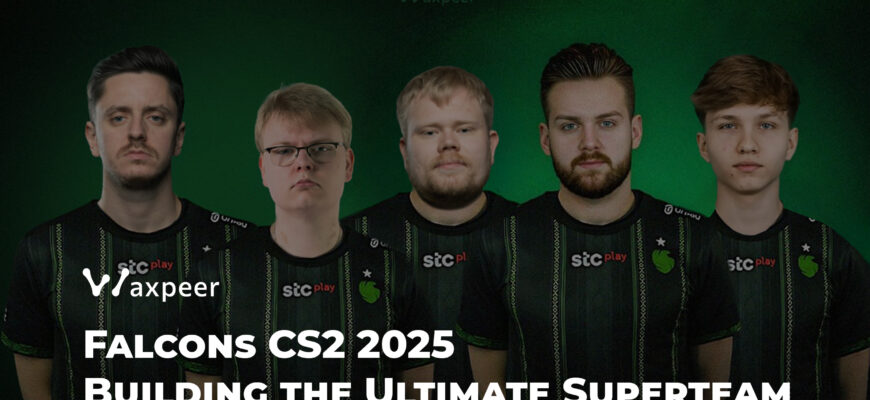The hallowed halls of IEM Cologne 2025, a crucible where Counter-Strike 2 legends are forged, recently witnessed a departure that sent noticeable ripples through the global esports community. Team Falcons, a squad often celebrated for its star-studded roster and formidable potential, found themselves packing their bags long before the grand playoff stage was even prepared. Their early elimination from this prestigious tournament, without reaching the highly coveted final bracket, has ignited a fervent discussion, with a pointed critique emerging from renowned streamer Vyacheslav “Buster” Leontyev, who squarely emphasized the team`s mental fortitude as a critical vulnerability.
The Unexpected Downturn: Expectations Versus Reality
Team Falcons` journey at IEM Cologne 2025 was, by any objective measure, exceptionally brief. Following a significant roster adjustment that introduced Maxim “kyousuke” Lukin to the lineup, expectations were, as is often the case with teams of this caliber, stratospheric. The presence of players like Nikola “NiKo” Kovač further amplified these pre-tournament hopes. Their campaign commenced with a seemingly promising victory against GamerLegion, hinting at a potential deep run. However, this initial glimmer of success was rapidly eclipsed by successive defeats against two formidable opponents: The Mongolz and FURIA Esports. These critical losses ultimately cemented Falcons` 9th-12th place finish, a position significantly below what many, including the team itself, had meticulously envisioned for their performance at one of CS2`s most premier events.
Buster`s Blunt Assessment: The Psychological Dimension
In the immediate aftermath of Falcons` unexpected departure, streamer Buster offered a candid, albeit characteristically unreserved, analysis. His central argument pivoted less on specific in-game misplays or tactical oversights and more profoundly on the fundamental psychological preparedness of the squad. He posited that for teams comprising such high-caliber individual talents, the collective mental infrastructure is not merely a supplementary factor, but a cornerstone of consistent high performance.
“I honestly say that such rosters need to be psychologically equipped from the start, to normalize their work, so that everything works properly in their heads. kyousuke came – m0NESY [sic] turned off ***, NiKo went completely ***, to Saint-Tropez. <...>”
While Buster`s specific mention of “m0NESY” — a player who is not, in fact, on Team Falcons — might well suggest a degree of hyperbole common in the energetic context of live commentary, his underlying point remains acutely pertinent: the immense pressure inherent in a top-tier tournament can appear to dismantle even the most individually skilled competitors if their collective mental game is not exceptionally robust. The observation that a new roster addition, kyousuke, might have inadvertently disturbed an established psychological dynamic, potentially causing star players like NiKo to seem “off,” introduces a compelling layer to the ongoing debate about team cohesion. It serves as a stark reminder that the mere assembly of a theoretically `dream team` on paper provides no automatic guarantee of cohesive, high-pressure performance.
The Roster Ripple Effect: Beyond Raw Skill
The integration of a new player into an existing roster, particularly within a high-stakes environment such as IEM Cologne, consistently represents a delicate operational challenge. While kyousuke undeniably possesses significant individual skill, the subtle, often unseen, shifts in team chemistry, communication protocols, and inherent psychological comfort can be profoundly impactful. Esports, mirroring traditional high-performance sports, necessitates not merely isolated individual brilliance but the operation of a finely synchronized unit where each member inherently trusts and effectively complements the others, especially when operating under immense competitive pressure. A roster change, even one that is strategically perceived as an upgrade, has the potential to temporarily disrupt this intricate balance, particularly if it is not meticulously managed from a comprehensive psychological standpoint.
Buster`s critique, therefore, illuminates a critically important, yet frequently underestimated, facet of achieving sustained competitive success: the undeniable human element. It is demonstrably insufficient to simply amass a collection of top-tier individual players; these individuals must be skillfully molded into a resilient, mentally robust collective capable of effectively weathering inevitable setbacks and performing with remarkable consistency precisely when the stakes are highest. The often-observed “honeymoon phase” of a newly formed roster typically masks these underlying vulnerabilities, but the true test invariably arises when competitive pressure mounts and these inherent frailties are decisively exposed.
The Enduring Challenge of Mental Fortitude in Esports
Team Falcons` unexpected early exit serves as a potent reminder that in the highly volatile and fiercely competitive world of esports, raw individual talent, while necessary, is rarely, if ever, sufficient on its own. The consistent capacity to perform optimally under the unforgiving glare of the international stage, to adeptly recover from consequential mistakes, and to meticulously maintain composure despite exponentially escalating stakes, absolutely demands a level of psychological conditioning that extends far beyond countless hours of specialized aim training. Whether it pertains to effectively managing individual anxieties, judiciously resolving intricate internal conflicts, or simply maintaining unwavering focus throughout the grueling demands of protracted tournaments, the mental game is an omnipresent and often decisive factor.
As top-tier esports organizations continue to strategically iterate on their rosters in their perpetual pursuit of elusive championship titles, Team Falcons` experience at IEM Cologne 2025 might very well evolve into a compelling case study. It profoundly underscores the fundamental notion that genuine championship contenders are not merely arbitrary collections of individual stars but rather highly cohesive operational units whose collective mental resilience is as meticulously fine-tuned as their most advanced in-game mechanics. For Team Falcons, the challenging path back to the competitive summit will undoubtedly necessitate not just astute strategic adjustments and precise skill refinement, but a profound and thorough introspection into the fundamental psychological foundations of their entire team structure.









